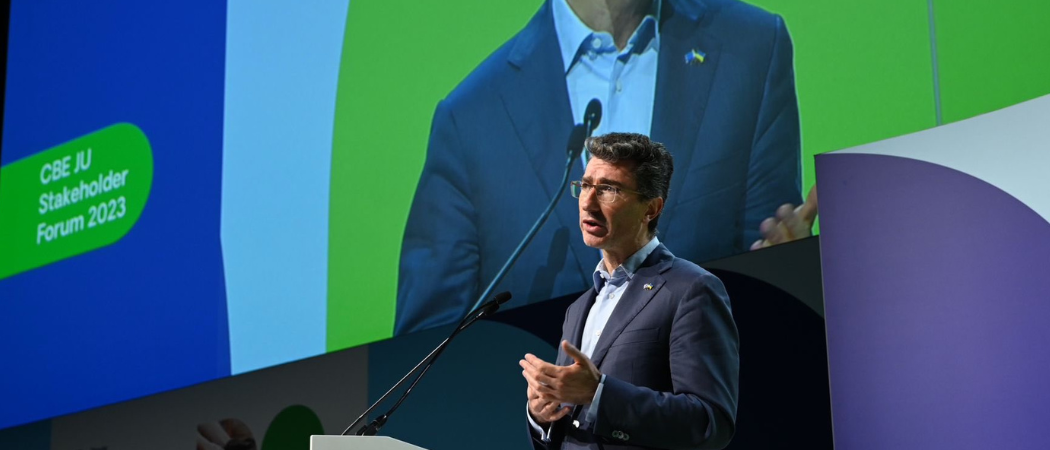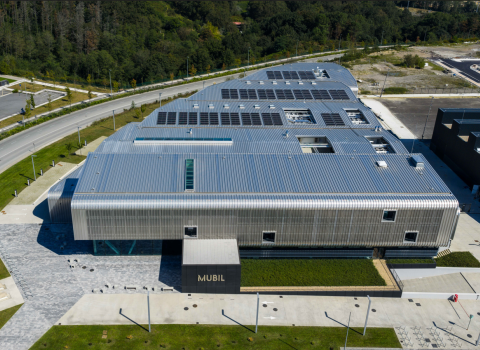Europe is a front runner in cutting CO2 emissions. Now it must do more to reap the economic benefits through home-grown production of green technologies, such as electric car batteries and solar panels, that underpin this transition, says research chief Marc Lemaître

Marc Lemaître, head of the European Commission’s research directorate general, speaking at a Circular Bio-based Europe joint undertaking meeting on December 6, 2023. Photo: CBE_JU / European Union
Europe is a frontrunner when it comes to reducing carbon emissions, but the lack of a wrap around industrial strategy means this is not translating to an economic benefit. As result, decarbonising is increasingly viewed only as a cost and an inconvenience, and opposition to the green agenda is mounting, according to Marc Lemaître, head of the European Commission’s research directorate general.
Speaking at a Circular Bio-based Europe joint undertaking meeting on Wednesday, Lemaître drew a line from ongoing efforts on decarbonisation to the need for a new circular economy agenda.
“We really need to make sure the second does not resemble the first,” he said. Beyond the progress on carbon emissions, “We did not exactly have the industrial plan to fit these objectives”. He gave the example of solar panels and electric car batteries, essential to the green transition, which are predominantly manufactured in China.
For Lemaître the EU has a “narrative problem”, which is preventing it from winning over society. With the June 2024 European elections approaching, there is “some pushback on the European green agenda”. In view of this, Europe needs a clear vision of how it can be a frontrunner on climate and the circular economy, while also maintaining a thriving and competitive economy.
Greater effort is needed in research and innovation. “We have the technologies we need to halve emissions by 2030, but beyond that we know that there are huge gaps in the solutions available today,” he said.
Green Deal ambitions
As a backdrop to this, Commission President Ursula von der Leyen was in Dubai this week announcing new climate pledges at the COP28 summit, maintaining the momentum generated at the start of her term in office when she presented plans for the European Green Deal ten days into her mandate.
Then, the headline pledge was to reduce Europe’s greenhouse gas emissions by 55%, by 2030 relative to 1990 levels, and to become the world’s first carbon neutral continent by 2050. Those targets became legally binding when the EU passed the Climate Law in 2021.
Concrete steps were taken towards the 2030 target as part of the Fit for 55 legislative package. These include a ban on the sale of new petrol and diesel cars from 2035, and increasing the binding target of 32% of renewable energy in the overall energy mix to at least 42.5% by 2030.
The EU also reformed the Emissions Trading System, under which companies in certain sectors can buy “allowances” corresponding to their greenhouse gas emissions.
Despite evident progress, in recent months the Green Deal has faced a backlash, notably from MEPs within von der Leyen’s own centre right EPP group, with Parliament striking down a proposal to reduce the use of pesticides, and watering down a law on nature restoration.
“We have to expect even more attacks on the Green Deal going forward,” German Green MEP Henrike Hahn told Science|Business. She hailed the reform of the emission trading system, the high renewables targets and the phasing out of combustion engine vehicles as major achievements.
The “resilience and strengthening of the Green Deal amid both sanitary and geopolitical crises” has been a notable success, but the required societal shift has been more difficult to achieve, Rosita Zilli, senior policy officer at the European Energy Research Alliance (EERA), told Science|Business, echoing Lemaître’s concerns.
She said the gap between the ambitious goals and public support is evident in recent national election results, with more member states “leaning towards conservative stances and supporting a watered down and less ambitious green agenda”.
Von der Leyen emphasised at COP28 that the EU is on track to surpass its 2030 target, and attention will soon turn to 2040. The European Scientific Advisory Board on Climate Change, an independent body which provides the EU with scientific advice, says a 90-95% reduction of emissions is needed by 2040.
The Commission is due to publish a communication on the 2040 target early next year, but it will be up to the next Commission to update the climate law to make this binding, meaning the upcoming elections could be decisive. In light of the political landscape, adopting the 90 - 95% target “might be tough” to achieve, Antoine Oger, research director at the Institute for European Environmental Policy, told Science|Business.
Oger also believes the lack of policy initiatives to implement the EU’s Farm to Fork strategy for sustainable food systems is a missed opportunity. “Agriculture is still a quarter of our emissions. As long as we don’t do anything on agriculture, we’re not going to get to our objectives,” he said.
Industrial phase
As Lemaître indicated, there is still plenty to do to ensure European industries can provide the technology needed for the green transition. In her State of the Union address in September, von der Leyen said Europe is finally ready to enter the industrial phase of the Green Deal.
“At the start of the mandate, industrial policy was rather a niche idea in Brussels,” said Hahn, who sits on the Parliament’s industry committee. This changed in response to the US Inflation Reduction Act, which provides generous subsidies for clean energy companies which relocate to the US, she said.
The Parliament and the Council recently struck a deal on the Critical Raw Materials Act, which aims to ensure the EU’s access to a sustainable supply of strategic materials.
Also under discussion is the Net Zero Industry Act, which sets the target of manufacturing 40% of the EU’s strategic net-zero technologies in Europe by 2030, by promoting investment and accelerating production, for example through quicker permitting for wind farms.
This will strengthen the competitiveness of the EU’s net-zero related technology industrial base, but it does suffer from a lack of focus, said Hahn, who criticised the inclusion in the Parliament’s proposal of support for nuclear and carbon capture and storage technologies.
For Zilli, the proposal is a good starting point, but more attention should be given to R&I, at both early and late stages of technological development. This is crucial not only for the development of innovative technologies, but also for “addressing supply chain challenges that might hamper an accelerated deployment of these technologies”, she said.
The Commission’s proposal for a €10 billion Strategic Technologies for Europe Platform (STEP) also seeks to support the Green Deal by accelerating investments in key digital, net-zero and biotechnologies.
Using existing financial instruments, the plan is more modest than the sovereignty fund originally promised by von der Leyen, but even this is thought to be at risk as negotiations continue over revisions to the EU’s long-term budget.
While the Commission’s industrial strategy reflects its focus on strategic autonomy, international collaboration is required to effectively tackle climate change. At COP28 on Saturday, von der Leyen launched a pledge by 118 countries to triple the installed capacity of renewable energy and double the rate of energy efficiency improvements by 2030.
The EU will invest €2.3 billion from its budget to support the energy transition in Europe and around the world. “We are united by our common belief that to respect the 1.5 degrees centigrade goal in the Paris Agreement, we need to phase out fossil fuels,” von der Leyen said.





 A unique international forum for public research organisations and companies to connect their external engagement with strategic interests around their R&D system.
A unique international forum for public research organisations and companies to connect their external engagement with strategic interests around their R&D system.